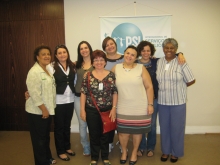Gender equality and equity: Flowing into the heart of Brazil’s unions

In Brazil, the Machismo tradition is firmly entrenched and despite great gains by the trade union movement in the past decade, gender equality has been harder to achieve in practice. After earlier success on gender pay equity, some affiliates struggled to continue to change and without more gender pay equity experts in Brazil that barrier has remained.
To contribute to overcoming this, the PSI National Women’s Committee adapted a guide on pay and gender equity and opportunities. The guide features three approaches: sensitisation of gender differences and salary discrimination; building strategies to remove barriers to women at work e.g. child care and accessing ‘men only’ jobs; and building strategies on pay equity itself.
The guide was widely distributed and a series of 4 sector-based national workshops were run on gender quality within unions and pay equity in the workplace. The male and female participants were mandated to run the seminars within their own unions and although the results have not yet been evaluated, it is estimated that 10 – 12 unions have run seminars.
2011 was national conference season for Brazil’s public sector unions and many conferences highlighted gender. For example Confetam’s theme was ‘public service quality and gender equity’, AFFECT SP put equality of remuneration between men and women as a major discussion. Others included FETAM/SP-CUT, FEMERG and FETAMCE.
PSI’s policy on 50/50 male/female participation in activities has paid off and is now also reflected within affiliate policy. It was also discovered that 78.3% of all PSI affiliates had created specific structures for women within their unions and that male to female ratio of union leaders stood at 40:60. Additionally PSI’s new energy affiliate recently elected its first women to its Executive Board and will be head of the Brazilian delegation at the 2012 PSI World Congress. The union also agreed to provide a permanent column for gender issues in its monthly newspaper. To overcome the challenge of infrequent opportunities to exchange experiences due to the size of Brazil, a Gender Facebook page has also been set up and is steadily becoming more popular.
Finally, seminars targeting men were also run. The first in 2010 was called ‘New Masculinity’ and the second in 2012 was called ‘Male and Female Genders in the Workplace’. These opened men’s eyes to the fact that women and men have different salaries and that despite taking civil service entrance exams for example, women’s work is undervalued. Eudes Wesley from Sindesp-SP summed up in the seminar video posted on the Facebook page:
“We have to see women as a companion, helper, as a partner and women, do not have to walk behind men, a woman has to walk side by side with a man, so they always help each other.”
For a complete survey of IMPACT/PSI trade union development cooperation between 2008 and 2013 click here: In the People's Interest
Map: IMPACT/PSI project collaboration between 2008 and 2013

